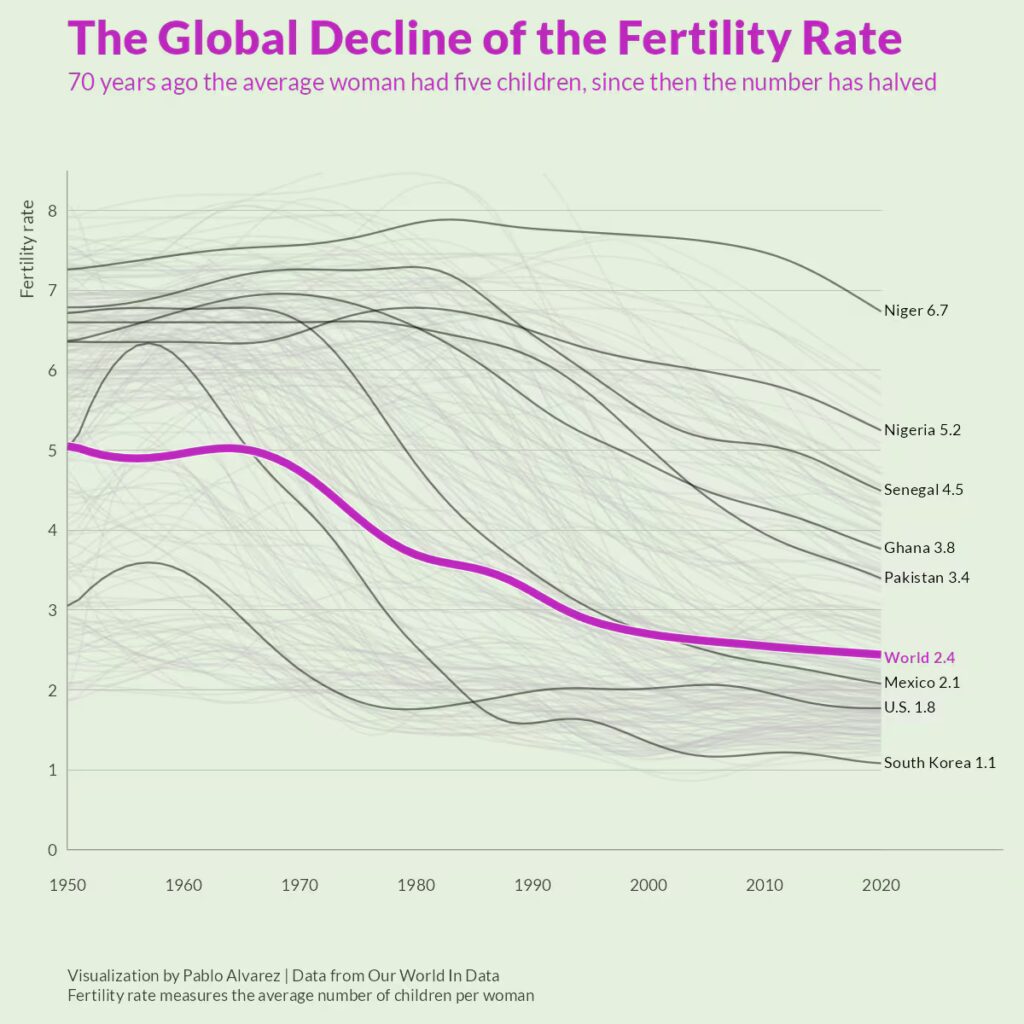Fertility rates and smartphones

There are a couple of intuitive explanations, preferred by those on the left and right respectively, for why birth rates are collapsing pretty much everywhere except in sub-Saharan Africa. The problem is that the data don’t support either of them.
(1) A liberal-left explanation for the sharply declining total fertility rate (FTR — this is the average number of children per women over a lifetime if current birth rates were to remain the same over the entire life of the cohort) in the USA, which has gone from 3.58 at the height of the baby boom 65 years ago to 1.62 last year, is that we have such child-unfriendly social policies. We certainly do, but the problem is that European countries such as Sweden with vastly better policies in that regard have even lower rates (Sweden is at 1.45. Replacement level is roughly 2.1).
(2) A lot of right wingers are arguing now that the basic problem is all this unnatural freedom for the women folk, who don’t realize they have an Obligation to God and the State to have lots of [white] babies. Matt Walsh:
Women do, in fact, owe children to the world. You stand on the shoulders of thousands of years of untold hardship. Women throwing it all away to live a pathetic and pointless life dedicated solely to intellectual and material gain is a vile act of generational betrayal and suicide.
The problem here is that TFR is also collapsing in extremely patriarchal and repressive societies all across North Africa and the Middle East.
Interestingly, the very lowest TFR is found in strongly patriarchal societies in which contemporary women have been granted any sort of real social and economic autonomy. South Korea is the paradigm case here, with an astounding TFR of 0.72.
A similar case may be arising in Mexico, which has recently seen a steep decline in TFR to below the US rate. This paper (in Spanish) calculates a TFR for Mexico of 1.6 in 2023. The result is that Mexico saw the same number of births that year as in 1964, when the country’s population was three times smaller.
Here’s an intriguing thesis, regarding a variable that is very strongly correlated with these trends across a large number of otherwise highly disparate societies. It’s from Alice Evans, a social scientist who has spent the last couple of decades studying this question in great detail:
But we do have this big increase in personal online entertainment, whether it’s watching shows on Netflix, sports bets — online gambling has become absolutely massive across Brazil and Latin America more broadly. You can go on PornHub. Online connectivity enables people to stroll on Instagram, play Call of Duty, World of Warcraft.
So we are all becoming — it’s not just being single — we’re all retreating into this digital solitude. I think that’s partly because technology makes it nicer and easier to stay at home — you can work from home — and some of these apps are so hyper-engaging that you get distracted by the constant stream of dopamine hits as each app, as each technology company competes against others to keep its users hooked.
And effectively, the tech is outcompeting personal interactions. That’s my fear. . .
I think that male-female friendships are a really important driver of gender equality. You come to care about someone as a friend as you listen to their stories, as you hear about how their day was or the kind of things they don’t like.
I was interviewing this guy in Catalonia in Spain, and he was telling me that they went to watch a football game at the bar and the women were saying that they didn’t like it when guys were rowdy or aggressive, or when one of his female friends was approached by a guy and she said no to him, he called her a puta — he called her a whore — and she was saying to her friend that that was distressing and she didn’t like that. Because he cared about his friend, he understood that and he empathized and he moderated his own behavior.
I think that building trust, rapport, understanding of what offends or — not even just offense, but having a sense of what matters to the other person, certainly, I absolutely agree that retreating into these digital spaces of solitude harms our understanding and also our solidarity more broadly. You know, the way that we care about other people.
Evans notes the very rapid rise of singles — of young people who are neither married nor in a couple — all across the world.
This may be related obliquely to the massive gender split we’re seeing in politics among young people in the US.
Smartphones are an incredibly powerful and pervasive technology that is, in historical terms, basically brand new. We’re obviously just beginning to grapple with some of their effects, and this may be one of the biggest.
